
Cuba took a very long time to grow on me, but by the time it was time to leave, I'd grown rather fond of the place.
Cuba's greatest asset is its people. They are simply wonderful; they're always eager to have a conversation, they're unfailingly polite and pleased to see you, and even the touts – who are few and far between compared to most countries – are a delight. If you politely tell them that no, you don't want to buy a cigar, they apologise for interrupting you and go back to hovering on the street corner; you don't find that in places like Morocco and Mali.
Cuba is also one of the safest places I've ever visited; we never felt threatened, even when wandering through the seediest parts of town, and the number of security guards and police on show in tourist spots is reassuring (and no doubt partly responsible for the small number of touts). It's also amazingly clean, even in the cities; sure, the sewers might pong a little on a hot day, but it's no worse than the fragrant waft of the Thames after a dry spell, and the streets themselves are generally devoid of litter.
The biggest criticism you hear about holidaying in Cuba – that the food is terrible – is also unfair. Sure, if you stay in an all-inclusive hotel or eat mainly in restaurants, then you're going to have a tough time finding high quality food, but if you stay in casas particulares you're in for a treat (just as long as you don't order fish). It's a little harder to find shops that sell anything useful, so you can get caught short in the middle of nowhere with nothing to eat except a limp ham sandwich from a shady-looking restaurant, but with a bit of planning you'll never go hungry... and there's always fruit, which Cuba does extremely well (I couldn't tear Peta away from the guava juice, which was so creamy it was like a cross between a melted sorbet and raspberries and cream).
It's not all joy and light, though. If you eat in restaurants then you must check your bill before you pay it, and check your change too; in tourist hangouts it's common practice to slip an extra drink or two on the bill, or to give change for a $10 note when you've paid with $20. Whenever this happened – and it happened a lot – I simply looked resigned and noisily left no tip, but with the imbalance of the dollar market, it's understandable why people try it on.
You'll find the odd tout or beggar who takes the piss, too. Beggars aren't that common, but you'll come across them every now and then. Some are, of course, genuine, but some have worked out that scamming tourists is more profitable than work. One guy in Remedios, of all places, hung round our car, and when he saw us coming he quickly ran a dirty cloth over the bonnet and asked us for money for cleaning it. I gave him some loose change one morning as I got into the car, and instead of looking pleased, he actually looked offended, holding it in his palm and making annoyed noises. He thrust a postcard in my face that read, 'I am deaf and dumb. Please give your consideration for me cleaning your car.' On the other side of the postcard was a picture of a 2 peso convertible note, and I looked at him in astonishment. I tried a quick bit of mental arithmetic: if the average wage is $13 a month and he was asking for $2, then given that the average UK wage is £25,000 per annum, that means he was asking for the equivalent of £320. If someone smeared dirt on your bumper in London and then demanded £320 for their efforts, they'd end up in hospital; I simply shook my head in disbelief and wound up my window, narrowly missing the cheeky little beggar's fingers.
I found the bars a bit disappointing too, with their consistently loud music killing the atmosphere. Sure, if you're lucky enough to find a bar where things are kicking off then the music is all part of it, but we failed to find anything worth the effort outside of the capital. Tellingly, our favourite bar of the whole trip was a quiet little affair on the square in Remedios, where they played precisely no music and you could sit outside, soaking up the sound of the locals gossiping and promenading in the town square. Salsa is one thing, but ambience is another.
But these are niggles, because for every touting tramp and noisy bar there's a whole bunch of smiling Cubans ready to make your day. The best thing you can do before visiting Cuba is to learn a bit of Spanish, because then you can enjoy the real thrill of Cuba: the Cubans. They're worth the journey alone.